In anticipation of Nikolaj Arcel’s upcoming screen adaptation of Stephen King’s The Dark Tower series (starring Idris Elba and Matthew McConaughey), the Deadshirt ka-tet of Max Robinson, Dom Griffin and David Uzumeri are taking a trip through the unique and sprawling fantasy/western novel series that inspired it.
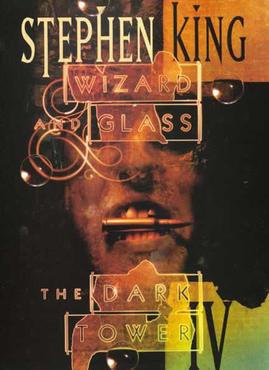
Max: Before we get started, a quick note from editorial on this delayed installment. Thanks to post-election stress and the fact that the Dark Tower movie’s been pushed back until next July, our road to the Tower is going to take more time than expected. Luckily for you, that means we can devote more time to other entries in King’s wider Dark Tower canon, like The Talisman or the novella “The Little Sisters of Eluria” (which we’ll delve into next month!). David?
David: We’ve now all finished reading the mammoth fourth installment of the Dark Tower series, Wizard and Glass, released in 1997 by Donald M. Grant in a two-volume slipcased edition with gorgeous art from Sandman and Arkham Asylum’s own Dave McKean, which does a great deal to establish this installment with its own distinct identity separate from the rest of the series, as well as within that 1990s dark fantasy zeitgeist. This is the big flashback installment, picking up Roland’s story from the flashbacks in The Gunslinger and showing the hardening of his heart, while also wrapping up the last book’s cliffhanger and providing a tantalizing glimpse into the future.
It’s also, very notably, the last Dark Tower installment before Stephen King got hit by a car in 1999.
I was never a big fan of this book until this reread. I thought it was overlong, a distraction from the main narrative, and basically a bunch of annoying melancholy bullshit that I had to force my way through to get back to the robot bears. As an adult, I realize that’s simply because I was too young to appreciate it. Wizard and Glass is basically the ultimate Stephen King book: it’s a Dark Tower dark fantasy, but this time all the characters are kids discovering love and regret and sorrow for the first time. There are moments in this book that hit me like a crazy riddling freight train; for instance, I can’t remember the last thing I read that so eloquently conveyed the combination of self-loathing and jealousy that accompanies the first person in your friend group getting laid.
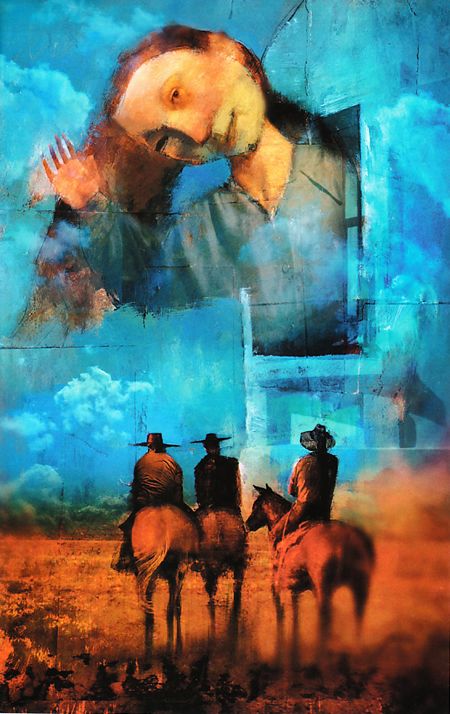
Dom: You know, when we started on this journey and I knew there’d be a whole book of teenage gunslinging flashbacks, I was not even a shred stoked about the possibilities. In the first book, those sequences didn’t do much for me, and the notion of staying within that period for a prolonged length of time was Not My Shit at all. HOWEVER, I ended up enjoying everything in the flashbacks more than the framing sequences. It’s almost like the Star Wars prequels done right? Like, the more time you spend with a character like Roland the more you naturally want to know his backstory. That’s how shit like Origin gets made. But this ends up being something really fascinating.
Roland’s youth reads like an episodic take on Hamlet if Hamlet was one of those Sam Raimi produced syndicated drama shows that occasionally featured Bruce Campbell. He’s just this irritable teen whose mom is fucking an evil magician and all of his angst is only intensified when they give him Jedi guns and missions. It’s honestly a pretty nutty way to dramatize a lot of relatable adolescent emotions.
Max: I honestly think Wizard and Glass might be my favorite book in the whole series? Like there are a ton of moments scattered throughout the series that I really love, but, as weird as it is that this essentially turns into a whole other book for most of its page count, W&G is what I think of when I think of Dark Tower. King’s great with big ensemble casts, and there’s so much humanity to the characters he fills up Mejis with, even bad guys like The Big Coffin Hunters (who are SUCH great villains). And even though it’s kind of slight compared to the meatier flashback portions of the book, the “modern day” stuff with Roland and Co. wandering through a plague-ravaged Kansas very familiar to King aficionados is ace.
David: The modern day section is a real turning point for the series in that it really firmly establishes the series as the nexus of Stephen King’s narrative multiverse. It’s worth pointing out that between Waste Lands and this, King put out a book called Insomnia, set in Derry, Maine, a few years after IT (although it bears no real relation). Just like 1986’s IT introduced the Turtle before his appearance as the Guardian of the Beam in Waste Lands, 1994’s Insomnia introduced not only the fully formed concept of the Dark Tower as a multiversal nexus, or that a boy named Patrick Danville would play a central role in Roland’s quest, but also the series’ main villain: the enigmatic Crimson King, whom Walter serves, who enters the Dark Tower narrative proper in this installment.
While a scene near the end of Waste Lands hinted at it highly, here it’s confirmed that the Tick-Tock Man’s resurrector is in fact Randall Flag of The Stand fame, and just to make it even more obvious, King literally has our ka-tet spend the first fifth of the book meandering through the actual world of The Stand (original, not revised, since Captain Trips was in the ‘80s here) via a spacetime rupture known as a thinny. The bookends to the central narrative pretty much set forward the series’ future remit, which is to be the unofficial sequel, and overarching ubernarrative, to basically everything Stephen King’s ever written or will write.
Dom: We’ve touched on it before, but it’s super nuts that this is a thing Stephen King really did. Can you imagine if John Grisham had a series that revealed a secret cabal was responsible for all the crimes and civil cases at the center of each of his legal thrillers? Or like, some massive conspiracy at the heart of every Nick Hornby novel that makes its protagonists converse in Smiths references? Fucking insanity.
Max: The Waste Lands left us on a cliffhanger, with Roland, Eddie, Susannah, Jake and their talking rat-dog about to face off with an evil robot train to determine if they live or die. This entire sequence is great, and it tells you just how good a book Wizard and Glass is that we get what would be a killer ending basically right up front. It’s really tense, and the resolution, with Eddie saving the day in a way that feels extremely natural, is very clever.
David: King sets it up basically perfectly in the last book, with the whole sequence where they’re riddling at the campfire and Eddie’s dumb jokes make Roland get all self-serious and dour-faced like the Dungeon Master yelling at the kid who just wants to get laid at the tavern. Eddie Dean from Brooklyn basically 4chan shitposts a supercomputer into suicide like a dirtbag Captain Kirk, and it’s so fucking cathartic and joyful to read that I can’t imagine anyone being disappointed in the resolution to that cliffhanger.
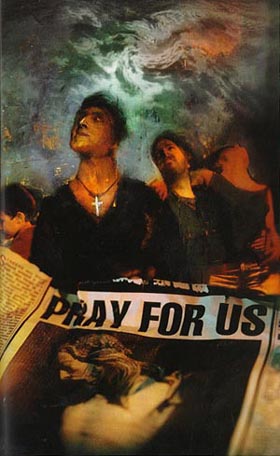
Dom: That comes back to one of the series’ greatest strengths, which is King’s ability to deliver a fantastic reading experience for each book, but it also make the parts that comprise each outing read like sharp, serialized fiction. The bookends make good narrative bread for the TEEN SOAP OPERA SANDWICH the meat of this installment seems to be. King uses the thinny the group encounters as an excuse for Roland to tell his New Crew about his Old Squad, and it’s kind of brilliant.
By cutting back to Roland’s first mission as a young gunslinger and showing his early hormone-driven adventures, soooo much of what makes him who he is becomes plain as day. He’s like this dashing, if sullen, Tiger Beat hero who balls it up and ends up an old man of indeterminate age doomed to repeat his mistakes until he gets his shit together. It kind of reframes the rest of the series as some fucked up Final Fantasy fan fiction, where Cloud is an old piece of shit lamenting Aeris for all time.
Max: After our heroes walk aimlessly through Stephen King’s The Stand for a little while, we finally get a good long look at the boy who would become the gunslinger. The flashback portion of the book really leans on a classically romantic cowboy story, even more so than in The Gunslinger. King’s descriptions of the natural beauty of Mejis — and the distinctly Mexico-inspired character he gives it — really impress upon you the value of what Roland and his world will go on to lose by the time we catch up with him. On its own, this would be a great Western, even divorced from its larger significance within Roland’s story and the Dark Tower cosmology.
David: I think more than Mejis-inspired, Mejis is Mexico, in much the same way Lud is New York — and there’s all kinds of fascinating implied stuff going on, like the fact that clearly there was a local population that spoke Spanish (or something like it) that got overtaken by white colonizers. It’s a Western, sure, about a lawman going down to Mexico and getting in over his head, but it’s also a coming-of-age story, and a tragic romance, and an Arthurian grail quest, except the grail fucking sucks (this is the book where the Arthurian stuff really starts being a big deal outside of just Maerlyn’s name), and an exploration of sexual politics and the emotional effects of infidelity… there’s a lot going on here, and it feels more meticulously crafted and rewritten than a lot of the rest of the series. A lot of the time I wonder if he wasn’t working on this book on the side while writing the rest of the series, tweaking and tweaking it into this final form.
Dom: That’s actually an interesting observation. We’re nerds who can’t help making Grant Morrison comparisons, but it’s like the difference between Moz writing Batman month to month versus rewriting Pax Americana over and over until it’s just right. There’s a nuance that stands out. As much as I’ve come to love Roland’s new team in the series thus far, his relationship with Cuthbert and Alain just has something special about it. It’s not even that those two are particularly amazing characters, per se, but together they’ve got this fascinating chemistry that stands in contrast to the way we’ve watched Roland interact thus far. There’s a kind of cohesion to the way they function, particularly in their first big stand-off with the Big Coffin Hunters. It’s got this thrilling, iconic tenor about it that I really dug, because I am a huge mark for #friendship.
The genre trappings are basically hung on a simulacrum of every Owen Wilson comedy, where it’s just Guys Being Dudes but one of the Guys lets a Chick come between them. Roland and the boys get sent on this mission, but from the minute our hero meets Susan Delgado, a young woman promised to the shithead Mayor, you just know things aren’t going to work out. Watching these boys way in over their heads trying to navigate their first real opportunity to be “men” and the first thing that begins to cause them problems being a pretty lady is proof that the King who first had the idea for this series is still alive and well within the much older man writing this chapter.
Max: Credit where credit’s due, Susan’s a pretty well developed character. I dig that we see a good chunk of this story through her eyes and experiences. When Susan dies, it’s tragic because it breaks Roland, but even more so because we know exactly what she’s thinking when it all goes down. Susan’s a pretty three-dimensional character, and even King’s supremely corny Roland/Susan sex scenes can’t take away from that.
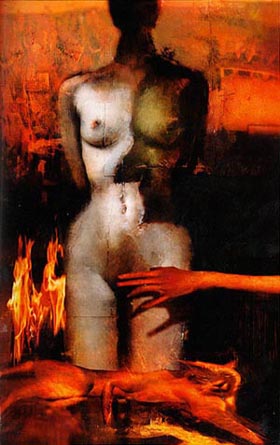
David: First off, supremely corny or not, they are leaps and bounds above Stephen King’s usual sex scenes. Boning is usually a short leap away from some terrible body horror in King joints, so it’s a relief to just have it be a prelude to tragedy. Susan being a three-dimensional character is a large part of what sets this book above so much of the Owen Wilson type stuff Dom was talking about. The central conflict in their relationship isn’t between love and duty for Roland; he’s got social carte blanche to fall in love with Susan and have forty kids with her. He’s never once worried about bringing her home to Steven and Gabrielle, and from everything portrayed of them, he has no reason to be worried. Susan’s the one with all the conflict; Susan’s the one who makes choices; Susan, really, and the witch Rhea, actually drive the narrative. Susan might die before the end — a tragedy everyone knows going in, from previous installments — but so much of this book is about her and Rhea and Coral Thorin and the unsung heroine, Olive, who so reminds Roland of his own suffering mother.
Dom: That’s a fair assessment. I just couldn’t resist imagining the set-up as a trailer with Swingers-era Vince Vaughn as Cuthbert, because I am trash. Also, unlike a lot of origin stories that leave so much to be desired, this one really delivers. Perhaps because everything about King’s work is a little more fluid, both by design of the mythology and also his propensity for editing finished works, there’s no real uncomfortable seams like the ones you’ll find trying to stitch most prequels to the stories they’re meant to precede. There’s a real sense of throughline between the Roland we see here and the one we return to in the framing sequence.
Susan’s death, in particular, is executed with the reliable amount of tragic power. From the moment we first hear Roland mention her name, we know that whenever we find out the story, it won’t be a happy one. But when he finally looks through Maerylin’s Grapefruit and sees her fate, it packs this serious wallop. It’s so easy for moments like that to feel like foregone conclusions, but King makes it feel so potent.
Max: Wizard and Glass is successful prequel solely on the basis that it’s mainly concerned with just telling a good story, with the revelations about what made Roland the way he is today being a natural outcome of that story rather than the total focus.
I want to talk about Rhea and Eldred Jonas for a minute, because they’re just some really terrific, weirdly vulnerable villains. Like they’re so well defined that they get…actual growth and character development? Jonas’s weird, super sexual romance with Coral Thorin is such a fascinating angle to explore. Just two evil people who fall in love! Rhea’s an interesting inversion of the pretty standard evil witch archetype because not only does she basically turn into a magical crackhead, she’s genuinely pretty hurt when Roland kills one of her pets. There are some really cool layers here.
David: Jonas and Coral works so well because the Big Coffin Hunters have been set up as these dark mirrors of Roland, Alain and Cuthbert — the leader, the silent-but-strong guy and the wiseass. So just as Roland finds true love in Mejis with someone as strongwilled and romantic as him, Jonas finds someone just as bitter and shitty, and they’re just wonderfully terrible people together. Wizard and Glass is the first book in the series to have real villainous characters, with motivations and desires; the Man in Black was more a destination marker than a character in the first book, and the series so far has been far more man vs. nature than man vs. man. Appropriately, this is reflected in the present-day narrative as well, with Randall Flagg finally appearing named and in the flesh to antagonize the ka-tet for a while to come.
I also was a huge fan of the dynamic among Roland, Alain and Cuthbert; King’s always been absolutely superb at writing kids this age, and this is no exception, with all three of them being incredibly fully realized characters basically right out of the gate. You can tell they’ve been simmering in Roland’s mind for years, with all the references to them in previous books; I’m looking forward to revisiting them when we finally get to Wind Through the Keyhole, which I realize now is very much the sequel to this installment.
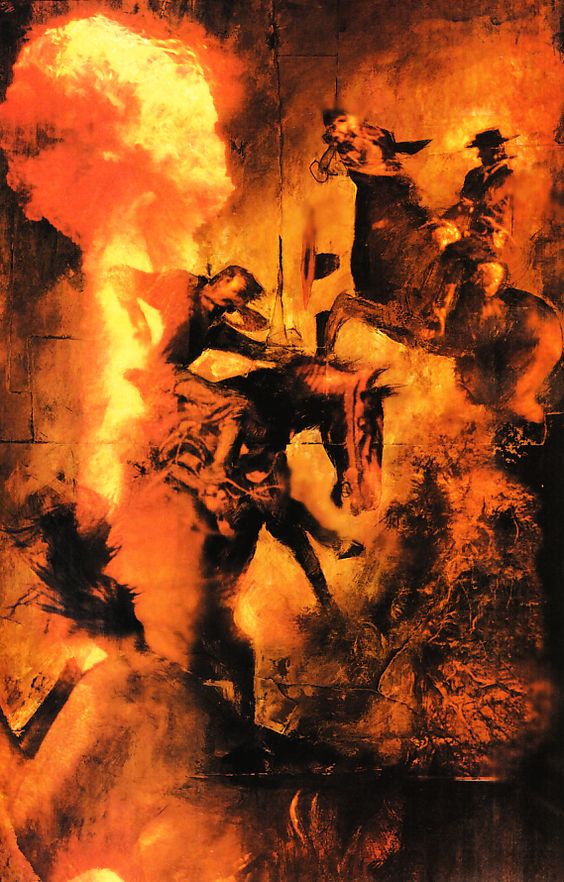
Dom: This book’s finale is pretty dope as well. After Roland is done telling the tale we’ve been so engrossed by, he and the rest of his current ka-tet wind up in a hilarious (but not entirely unexpected) protracted Wizard of Oz reference, The Emerald City. At first, I was a little like “fuckin’ really?” but honestly the literary allusions feel so right that it’s hard to be bothered even by the blunt ones. Speaking of villains, Flagg returns, as well as Andrew Quick/The Tick-Tock Man, setting us up for one final piece of soul-crushing Roland tragedy to chew on until the next installment.
Mirroring the “Susan’s grapefruit death” reveal, Roland takes the crew inside the glass to confess one last depressing coda to his tale, showing us his mother’s death, at his own hands. It’s another in a long list of reminders that being around Roland is a hazard to your health and potentially your continued existence. It provides the perfect moment for his new friends to get the entire fuck off of the Follow This Weird Asshole To Certain Death train. Instead, they soldier on with this new information. I had half-figured we’d get a different kind of cliffhanger here, but this one rings true.
Max: The homestretch of Wizard and Glass kind of lulls you into a false sense of security with this goofy segment where Roland and company have to fight Randall Flagg (who, I don’t think this is a spoiler, is definitely The Man in Black) in a big fucked up Wizard of Oz palace that ends on the super heavy reveal that Roland was tricked into killing his mother. Roland’s current-day ka-tet sort of takes a backseat in this book, but that they accept and support Roland when the entirety of his life story is basically laid bare before them is pretty powerful stuff.
David: Their reactions are some of my favorite parts of this; I love how they all hold it together, and then Susannah and Eddie go to the bushes to pee and end up fucking bawling in each other’s arms about how insanely heavy the shit Roland just confessed was. The bit with Roland shooting Gabrielle is foreshadowed here — Roland mentions that he stopped his father’s assassin without mentioning who it is, and Susannah figures it out — but the brutality of the scene as it plays is just horrifying, and it’s also a really clever sleight of hand from King: once you get to Susan’s horrible death, you feel like you’ve gotten to the main tragedy, but he one-ups the one you knew about going in with one possibly even more devastating. It’s all, of course, because Roland, at age four-fucking-teen, consciously chose the Tower: over the love of his life, over his family, over his friends, over everything that makes him human. It’s not a subtle addiction metaphor, but it’s a very functional one, and from King it feels very personal.
Dom: I honestly just teared up even reading that observation. Roland’s like one of the all time great fictional badasses, but his story is so relatable and touching and fucked up and raw. It’s not that Wolverine bullshit where he’s just a furry ball of wish fulfillment with the occasional dead ninja girlfriend thrown into the fridge for fuckin’ kicks. It’s this really touching story about one man’s obsessive quest and how it affects those around him.
NEXT MONTH: THE GANG TACKLES THE TALISMAN AND “THE LITTLE SISTERS OF ELURIA”

